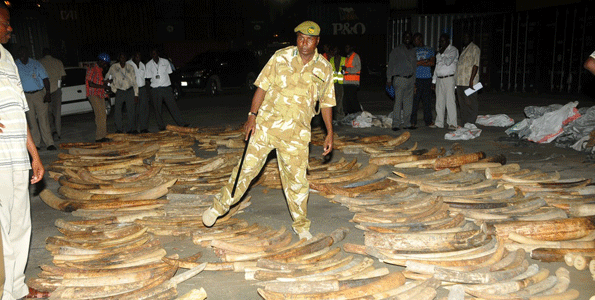
Sunday, January 20, 2013
by Jonathan Mwanyindo, Kenfrey Kiberenge and Edith Fortunate

The Kenya Wildlife Services officer in charge of Coast Region Simon Gitau, inspects some of the 638 pieces of ivory tusks which were impounded from a container at the port of Mombasa on transit to Indonesia. Photo/FILE NATION
Gangs from neighbouring Somalia and former game rangers are behind the stepped-up poaching of Kenyan wildlife, a senior government official says.
Head of Public Service Francis Kimemia says he has directed the Kenya Wildlife Service (KWS) top leadership to investigate and furnish the Office of the President with findings into the Somalia link.
Just last week, a gang of 10 poachers killed a family of 11 elephants in Tsavo National Park in the illegal hunt for tusks.
In total, Kenya lost 375 elephants and 20 rhinos to poaching in the past year compared to 289 elephants and 29 rhinos the year before.
Eighty per cent of the elephants were poached on private conservancies and 20 per cent in the national parks and game reserves.
“They are supposed to submit a report on how we lost 300 elephants in a very short time. This happened in 2012 and it is very wrong,” he said.
Mr Kimemia said perpetrators should be brought to book because they are infringing on the country’s territory and also posing a security threat. He noted that the poaching has largely been happening in the conservancies.
“The matter is a national security issue, and KWS officials need to tell us why it has persisted and why they are not preserving our conservancy,” he said. “We want to know if it is an outside or inside job; the issues have to come out in the open. It has to be known who is behind the poaching.”
KWS spokesman Paul Mbugua also confirmed that most of the poachers shot in the act usually do not have any identity cards and their bodies are never claimed.
Independent investigations by the Sunday Nation established that the escalation of poaching could also be a result of a go- slow by the KWS rangers out to force better terms.
The rangers we spoke to said junior rangers are paid a field allowance of Sh110 while their seniors get Sh200 per day. The money is paid whenever they move outside the protected areas for operations such as chasing after the poachers or handling a stray animal.
“Tell me, you are going after somebody who has stolen five tusks each worth over a million shillings and at the back of your mind, you know you will get Sh110. Does that make sense?” a ranger who sought anonymity to avoid victimisation told the Sunday Nation.
In China, elephant tusks can fetch an estimated Sh77,400 ($900) per kilo, while a kilo of powdered rhino horn can net as much as Sh5.6 million ($65,000).
Furthermore, KWS lacks a clear structure for promotion. Recently, senior officers from the head office are said to have visited various stations around the country and conducted oral interviews and ended up promoting 220 officers. The officers are currently undergoing promotion training at the KWS training school in Manyani.
According to the rangers, one’s oratory skills played a role in the exercise. The rangers now want the promotions recommended by their immediate bosses whom they say understand their abilities.
In addition, some rangers have not been transferred in more than 10 years, raising the possibility of being compromised by poachers.
KWS Director William Kiprono has denied any knowledge of sabotage but promised an investigation.
“If somebody is caught sabotaging operations, we will deal with them accordingly,” he vowed last Wednesday. “The law is very clear; you cannot kill because you want something. It’s like your home; when there is no food, do you go burning the house?”
Last year, two KWS rangers were arrested and charged with poaching in Tsavo National Park.
Working with criminals
“Intelligence reports indicate that some dishonest KWS personnel are in cahoots with criminal gangs to undermine the fight against poaching. The management should smoke them out,” KWS board of directors chairman David Mwiraria said.
The elephant population in the country has been dwindling fast due to poaching fuelled by demand for ivory and elephant teeth.
Mr Kimemia’s directive comes days after the government said it had launched investigations following the recovery of 638 pieces of ivory estimated to be worth Sh100 million that were impounded at the port of Mombasa on Tuesday.
The consignment, weighing two tonnes, was intercepted at the container verification area of the port by Kenya Revenue Authority (KRA) officials after receiving a tip-off from their head office in Nairobi.
Mr Kimemia said the investigations are meant to establish the source of the ivory and prosecute those responsible for killing wildlife for self-gain.
“Losing our animals to poachers is the most despicable thing. How does someone do that for self-gain? The investigations are meant to unravel the source of the ivory,” said Mr Kimemia.
According to KRA deputy commissioner in charge of port operations Gitau G. Gitau, the consignment was packed in a 20-foot container that was destined for Indonesia aboard mv LalaBahadur.
He said a similar shipment was also intercepted in Hong Kong after it evaded verification a month ago in what he termed “use of fake documents for clearance at the customs and Kenya Ports Authority”.
“As we speak, the clearing agent will be relieved of his customs password; we will suspend him and zero in on the importer,” he added.
He pointed out that the use of bogus documents was also key in the process that ensured the other consignment was shipped to Hong Kong before it was intercepted by officials in Mombasa.
KWS assistant director at the Coast, Mr Simon Gitau, who counted the pieces, said the tusks may have come from outside Kenya “because the sacks have labels of Tanzania and Rwanda.”